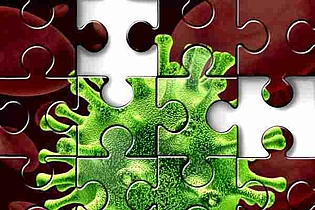Topic in Focus
The pros and cons of genome editing

Picture: freshidea - Fotolia
All over the world, scientists are discussing the opportunities and risks of genome editing. Plant geneticists want to breed resilient, high-yield plants to combat famine. Critics warn against the unpredictable impact on human health and the environment. Medical experts want to cure hereditary diseases and treat cancer while ethicists fear that this could lead to “designer humans”.
Genome editing in crops
All over the world, scientists are discussing the opportunities and risks of genome editing. Plant geneticists want to breed resilient, high-yield plants to combat famine. Critics warn against the unpredictable impact on human health and the environment. Medical experts want to cure hereditary diseases and treat cancer while ethicists fear that this could lead to “designer humans”.
Genome editing in humans
Medics hope that they will be able to cure monogenic hereditary diseases such as Huntington’s disease, muscular dystrophy and cystic fibrosis. Interventions into the immune system also make it possible to treat acquired diseases such as cancer and AIDS. But many ethical issues have not yet been resolved. What impact do the changes have on the interaction of the genes? And how can we prevent unwanted, “off-target” effects that may, for example, modify genes that were not supposed to be modified and could cause cancer?
Changes to the germ-line
In medical applications, a basic differentiation has to be made between modifications to body cells and modifications to germ-line cells such as egg and sperm cells. Changes to the germ-line are inherited to the next generations. In Germany, as in several other European countries, interventions to the germ-line are prohibited. The US and United Kingdom are considering exemptions in the case of monogenic hereditary disorders. However, the long-term effects of this type of germ-line treatment cannot be foreseen. Ethicists are concerned that if genetic defects can be corrected at the embryonic stage, other traits could also be transferred into the genome, such as higher intelligence or stronger muscles. How far away are we then from “designer humans”?
Research and responsibility
In spite of all the unanswered questions, the German academies and the German Research Foundation (DFG) believe that Germany should participate in research in this field and work towards the responsible application of the techniques involved. Regarding human germ-line modifications, however, that can be inherited to the next generation, the academies and the DFG are in favour of an international moratorium, as are numerous international researchers. On the contrary, chinese scientists supposedly already changed the genome of human embryos, making use of CRISPR/Cas9. The German science academies call for a societal debate: Before mankind starts rewriting its own DNA through germ-line interventions, the open issues need to be discussed and the associated benefits and potential risks evaluated by the scientific community and society as a whole.
